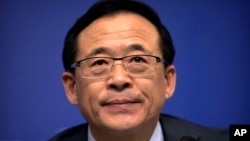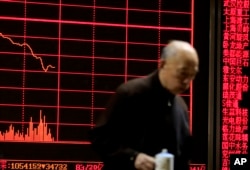China’s new securities regulator has made it clear that there will be no relaxation in the government’s control on crucial aspects of the stock market for the time being.
Official control over initial public offerings and government-sponsored trading, however, will continue.
Liu Shiyu, the new chairman of the China Securities Regulatory Commission, said recently that the much-awaited reform in the IPO registration system will not take place anytime soon.
“Supporting the reforms will require a process and a period of time, and the reform of registration-based IPO system can’t move ahead on its own,” Liu said. The IPO registration system, which had been listed on the government’s agenda in early 2015, would eventually be implemented but there was no timetable for it, he said.
If implemented, the reform would force the CSRC to give up its power to vet the plans of companies seeking to raise funds through IPOs. It will give issuers greater independence to determine IPO pricing by merely registering them with the stock exchange.
Oliver Rui, professor of finance and accounting at the China Europe International Business School said, that the CSRC move would slow down the pace of stock market reform and not enhance the efficiency of asset allocation.
“I wish the government could change its mindset on governance and let the stock market run by itself.Frequent intervention from the government does not help,” he said.
Sponsored trading
The new CSRC chief also said government-run organizations, which artificially prop up the market during a fall, will continue to operate. There were no plans to stop them from playing their roles, he said.
China makes no secret of the fact that it directly intervenes in the market with massive amounts of money to keep it from falling drastically.
The government-run China Securities Finance Corp. has played a major role in softening the market during incidents of major turbulence, which resulted in total losses of about $5 trillion since April last year.
The fund has invested in almost 600 publicly traded companies, according to Bloomberg data.
An earlier attempt to control market behavior through a tight circuit breaker system resulted in a massive crash last month. The CSRC was forced to withdraw its rules. The government replaced its chief, Xiao Gang, with Liu.
Tanker without engine
“The impact of the slumping stock index on the financial market at the time was like an oil tanker truck whose engine was not working as it went down a steep road,” Liu said at the press conference on the sidelines of China’s annual legislative session.
“In a less severe scenario, the truck might be destroyed and the driver die.In the worst case it could lead to forest fires and threaten innocent lives.”
Stock players expected the government to take a more market-friendly approach after the circuit breaker fiasco, analysts said; but, they may have to wait to see that happen.
At least 700 Chinese companies have planned IPOs, but some of them might be delayed, sources said.
“The regulator still regards market stability as a top priority,” Johnny Fang, senior analyst with consulting firm, Z-Ben Advisors, said. Although the CSRC continues to control IPO vetting, there has been a significant improvement in its efficiency since the beginning of 2016, he said.
The government control over IPO vetting had led to serious corruption, and at least three senior regulatory officials have been charged with it.
They include Yao Gang, a CSRC vice chairman at the regulator in charge of IPO issues, who was placed under investigation for serious disciplinary violations – a euphemism for corruption. Two other officials dealing with IPOs, Li Liang, and Li Zhiling, have been detained for the same reason.






